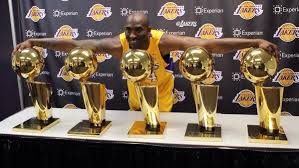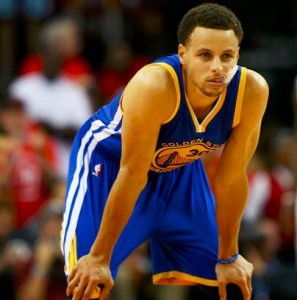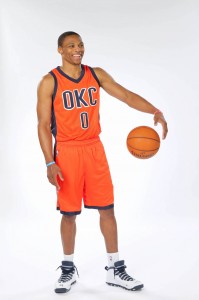 What would it take for Kobe Bryant to win the 2015-2016 NBA MVP award?
What would it take for Kobe Bryant to win the 2015-2016 NBA MVP award?
As we handicap the MVP race for the 2015-2016 season, we’ll take a look at last season’s top five finishers— Stephen Curry, James Harden, Russell Westbrook, Anthony Davis and LeBron James— along with Kevin Durant. But a question many Angelenos and basketball fans around the world have is what kind of numbers would Bryant have to put up in his age-37 season to take home the crown?
 To answer that, here are some facts. The MVP award was first given after the 1955-1956 season. The award has only been won by a player over 30 years old (31 and up) on eight occasions. The oldest winner was Karl Malone, who won the award in the lockout-shortened 1998-1999 season at age 35.
To answer that, here are some facts. The MVP award was first given after the 1955-1956 season. The award has only been won by a player over 30 years old (31 and up) on eight occasions. The oldest winner was Karl Malone, who won the award in the lockout-shortened 1998-1999 season at age 35.
The greatest players ever did not have the longevity, or the mileage on their bodies, like Kobe’s had in his career. So it’s tough to quantify what we can really expect from Bryant, especially after such a long injury layoff. To put this into perspective, Jerry West played 31 games in his age 35 season. Larry Bird played 45 games in his final season, also at 35. Oscar Robertson played 70 during his age-35 season. Can Kobe play 70 games, much less 82, after the injuries he’s recently sustained?
Adding in Michael Jordan’s first season with the Wizards at age 38, here’s a chart comparing some of the last seasons of all-time great players in Bryant’s class, including Malone’s MVP season at age 35:
| Player | Year | Age | Team | FG % | Points | Rebounds | Assists | Steals | PER | O Rating | D Rating | WS | WS/48 |
| Michael Jordan | 2001-2002 | 38 | Wizards | 41.6 | 22.9 | 5.7 | 5.2 | 1.4 | 20.7 | 99 | 105 | 3.3 | 0.075 |
| Larry Bird | 1991-1992 | 35 | Celtics | 46.6 | 20.2 | 9.6 | 6.8 | 0.9 | 21 | 112 | 104 | 5.5 | 0.159 |
| Oscar Robertson | 1973-1974 | 35 | Bucks | 43.8 | 12.7 | 4 | 6.4 | 1.1 | 14.2 | N/A | 98 | 5.9 | 0.113 |
| Karl Malone | 1998-1999 | 35 | Jazz | 49.3 | 23.8 | 9.4 | 4.1 | 0.6 | 25.6 | 112 | 96 | 9.6 | 0.252 |
These are all really good numbers for players their age (Bird shot 40.6 percent from three that season) but Jordan, Bird and Robertson weren’t going to win MVP those years.
Can Kobe lead the Lakers to the playoffs, win the scoring title and have a 25-plus PER season at 37 years old? If he can pull off all three, you’d better believe he will be in the discussion.
No MVP has had fewer than 10.4 win shares in a non-lockout season since Bill Walton had 8.4 in 55 games for the 1977-1978 Blazers. Walton was 25 that season. Can Kobe defy the odds? If anyone could do it, it’s probably Bryant.
Let’s move on to the other candidates, starting with the reigning MVP.
Stephen Curry, PG, Golden State Warriors
 When it comes to voting for a most valuable player, voters should conceptually view each season individually and independently of the season prior.
When it comes to voting for a most valuable player, voters should conceptually view each season individually and independently of the season prior.
But it’s really hard to top the success the Warriors had as a team, going 67-15 and easily looking like the class of the league during the regular season.
Individually, Curry’s 44.3 field goal percentage from three was the highest of any MVP in history.
He also led the league in free throw percentage and win shares per 48 minutes. For historical perspective, here are the last five seasons of players who won their second consecutive MVP award:
| Player | Year | FG % | 3 FG % | Points | Rebounds | Assists | PER | O Rating | D Rating | WS | WS/48 | Team Record |
| LeBron James | 2012-2013 | 56.5 | 40.6 | 26.8 | 8 | 7.3 | 31.6 | 125 | 101 | 19.3 | 0.322 | 66-16 |
| LeBron James | 2009-2010 | 50.3 | 33.3 | 29.7 | 7.3 | 8.6 | 31.1 | 121 | 102 | 18.5 | 0.299 | 66-16 |
| Steve Nash | 2005-2006 | 51.2 | 43.9 | 18.7 | 4.2 | 10.5 | 23.3 | 121 | 109 | 12.4 | 0.212 | 54-28 |
| Tim Duncan | 2002-2003 | 51.3 | 27.3 | 23.3 | 12.9 | 3.9 | 26.9 | 112 | 94 | 16.5 | 0.248 | 60-22 |
| Michael Jordan | 1991-1992 | 51.9 | 27 | 30.4 | 6.4 | 6.1 | 27.7 | 121 | 102 | 17.7 | 0.274 | 67-15 |
| Averages | 52.24 | 34.42 | 25.78 | 7.76 | 7.28 | 28.12 | 120 | 101.6 | 16.88 | 0.271 | 62.6-19.4 |
Aside from the case of Steve Nash, this list of the most recent repeat winners suggests that it’ll be tough for Curry to achieve these goals. Unless Golden State wins at least 65 games again and Curry overwhelmingly dazzles the voters, it seems like one of the following people on this list will take home MVP.
James Harden, SG, Houston Rockets
There’s a reason why a vote of their peers named Harden MVP over Curry during July’s NBPA Players Choice awards. He led the league in scoring, win shares, free throws made and attempted and minutes played. But if Harden didn’t win MVP last year, what will it take for him to win it in 2015-2016?
Houston won 56 games in the regular season and took the second seed in the Western Conference. Can the Rockets improve on that this season in a Southwest Division that could be the toughest division in the sport in quite some time?
If we saw Harden at his peak last year, then it’ll be tough for him to win it. Here’s to hoping he can find a way to elevate his game and put up even better numbers. Sheridan thought he was a worthy enough candidate to give him his MVP vote at the conclusion of last season.
LeBron James, F, Cleveland Cavaliers
Sure, LeBron James is still the best player on the planet, but his shooting numbers dipped dramatically last season. His field goal percentage was its lowest in seven years and his win shares and win shares per 48 minutes were at his lowest levels since his rookie season of 2003-2004 when he was 18 years old.
Granted, James’ numbers last year would be career bests for a vast majority of the league, but take a look at how his numbers dropped compared to his most recent MVP season:
| Year | FG % | 3 FG % | Points | Rebounds | Assists | PER | O Rating | D Rating | WS | WS/48 |
| 2014-2015 | 48.8 | 35.4 | 25.3 | 6 | 7.4 | 25.9 | 112 | 105 | 10.4 | 0.199 |
| 2012-2013 | 56.5 | 40.6 | 26.8 | 8 | 7.3 | 31.6 | 125 | 101 | 19.3 | 0.322 |
With Kyrie Irving out the first few months of the season with a broken kneecap and Kevin Love still on the mend (but likely to play in the season opener in a month against Chicago), James will have the opportunity to once again prove how valuable he is. Will a 60-win season and the top seed in the East be enough if he puts up his regular Jamesian numbers?
Russell Westbrook, PG, Oklahoma City Thunder
There’s no question that Westbrook was the league’s best player for a stretch of time last season when Kevin Durant was out with his foot injury. He dazzled the league with his triple-doubles and individual heroics after the All-Star break.
| Westbrook | FG % | Points | Rebounds | Assists | Steals | Usage | O Rating | D Rating |
| Before ASB | 43.1 | 25.8 | 6.3 | 7.6 | 2.15 | 37.3 | 111 | 103 |
| After ASB | 42 | 31.4 | 8.6 | 9.9 | 2 | 39.2 | 112 | 107 |
 If those numbers don’t impress you, from Feb. 1 on, Westbrook scored 32.6 points per game to go with 8.1 rebounds and eight assists.
If those numbers don’t impress you, from Feb. 1 on, Westbrook scored 32.6 points per game to go with 8.1 rebounds and eight assists.
The problems? Westbrook couldn’t guide his team to the playoffs, falling just short of New Orleans for the 8th seed. Durant will likely be back at full strength this season, possibly relegating Westbrook back to his modified sidekick role alongside KD in a contract year. As the Thunder are currently constituted, it’ll be tough for Westbrook to have as good an opportunity as he had last year.
Anthony Davis, C, New Orleans Pelicans
Anthony Davis is entering his age-22 season. Players this young aren’t usually this good unless they’re on track for spectacular careers, but is Davis good enough to join the Hall-Of-Fame big men to win MVP at such a young age?
Bill Russell, Wilt Chamberlain, Kareem Abdul-Jabbar, Bob McAdoo, Bob Pettit and the late Moses Malone each won their first MVP awards in their age-23 season. What can Davis accomplish this year in his age-22 season, the year Wes Unseld won his MVP?
Here’s a chart showing what kind of numbers these all-time greats posted in their young MVP seasons.
| Player | Year | Team | FG % | Points | Rebounds | Assists | Blocks | PER | O Rating | D Rating | WS | WS/48 |
| Bob Pettit | 1955-1956 | St. Louis Hawks | 42.9 | 25.7 | 16.2 | 2.6 | N/A | 27.3 | N/A | N/A | 13.8 | 0.236 |
| Bill Russell | 1957-1958 | Celtics | 44.2 | 16.6 | 22.7 | 2.9 | N/A | 22.8 | N/A | N/A | 11.3 | 0.206 |
| Wilt Chamberlain | 1959-1960 | Phila. Warriors | 46.1 | 37.6 | 27 | 2.3 | N/A | 28 | N/A | N/A | 17 | 0.245 |
| Wes Unseld | 1968-1969 | Baltimore Bullets | 47.6 | 13.8 | 18.2 | 2.6 | N/A | 18.1 | N/A | N/A | 10.8 | 0.175 |
| Kareem Abdul-Jabbar | 1970-1971 | Bucks | 57.7 | 31.7 | 16 | 3.3 | N/A | 29 | N/A | N/A | 22.3 | 0.326 |
| Bob McAdoo | 1974-1975 | Buffalo Braves | 51.2 | 34.5 | 14.1 | 2.2 | 2.1 | 25.8 | N/A | N/A | 17.8 | 0.242 |
| Moses Malone | 1978-1979 | Rockets | 54 | 24.8 | 17.6 | 1.8 | 1.5 | 23.7 | 117 | 104 | 14.1 | 0.2 |
Can Davis accomplish this much at such a young age to win MVP? Improvement for Davis and his Pelicans will be necessary. Can Davis beat out such strong competition to join this elite list of young MVPs?
Kevin Durant, SF, Oklahoma City Thunder
Durant has built a good case for his candidacy based on what happened when he didn’t play last season. Sure, Westbrook had a sensational stretch of basketball but OKC missed the playoffs and Scott Brooks was replaced as head coach by Billy Donovan.
Not that Durant needs to prove much to people that he’s deserving of a mega-max contract, but if he posts his best season in a contract year and leads the Thunder back to their status as an elite team, it could be enough to garner KD his second MVP award.
(RELATED: Gambling guru forecasts who to wager on in the 2015-16 NBA MVP race)
Shlomo Sprung is a national columnist for SheridanHoops who focuses on analytics, profiles and features. He is also the web editor of the Brooklyn Daily Eagle. A 2011 graduate of Columbia University’s Journalism School, he has previously worked for the New York Knicks, The Sporting News, Business Insider and other publications. You should follow him on Twitter.